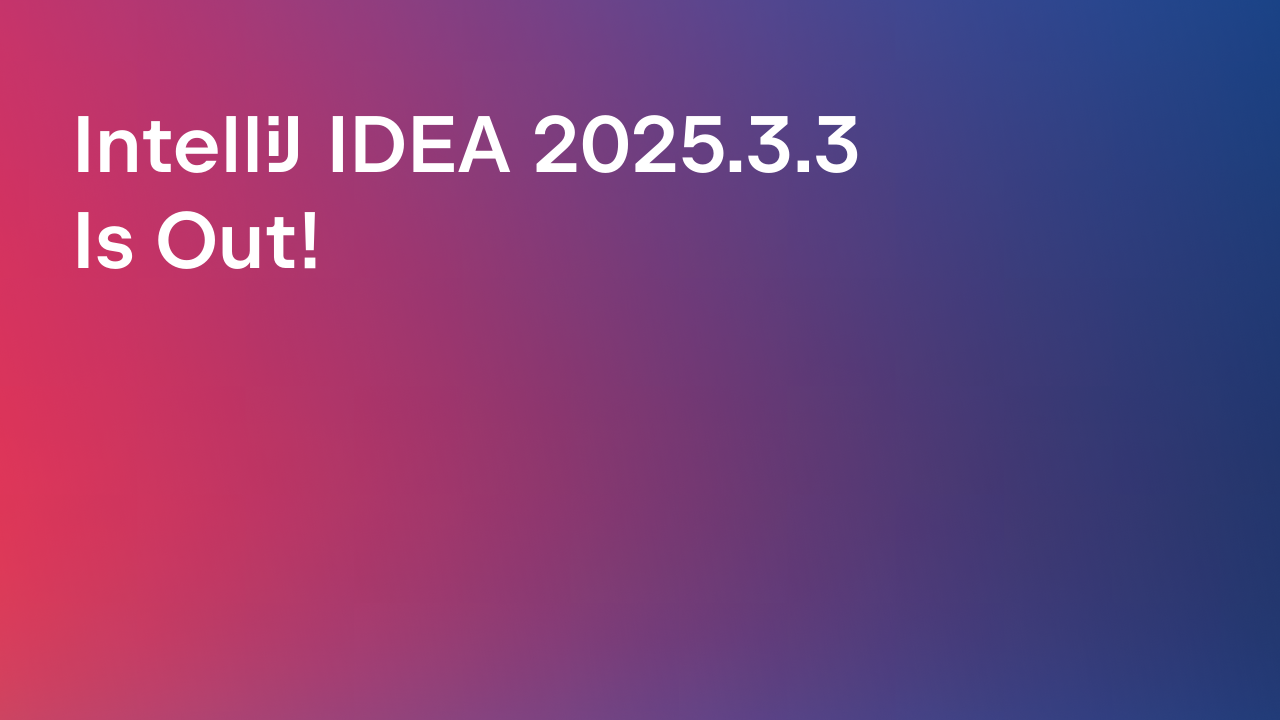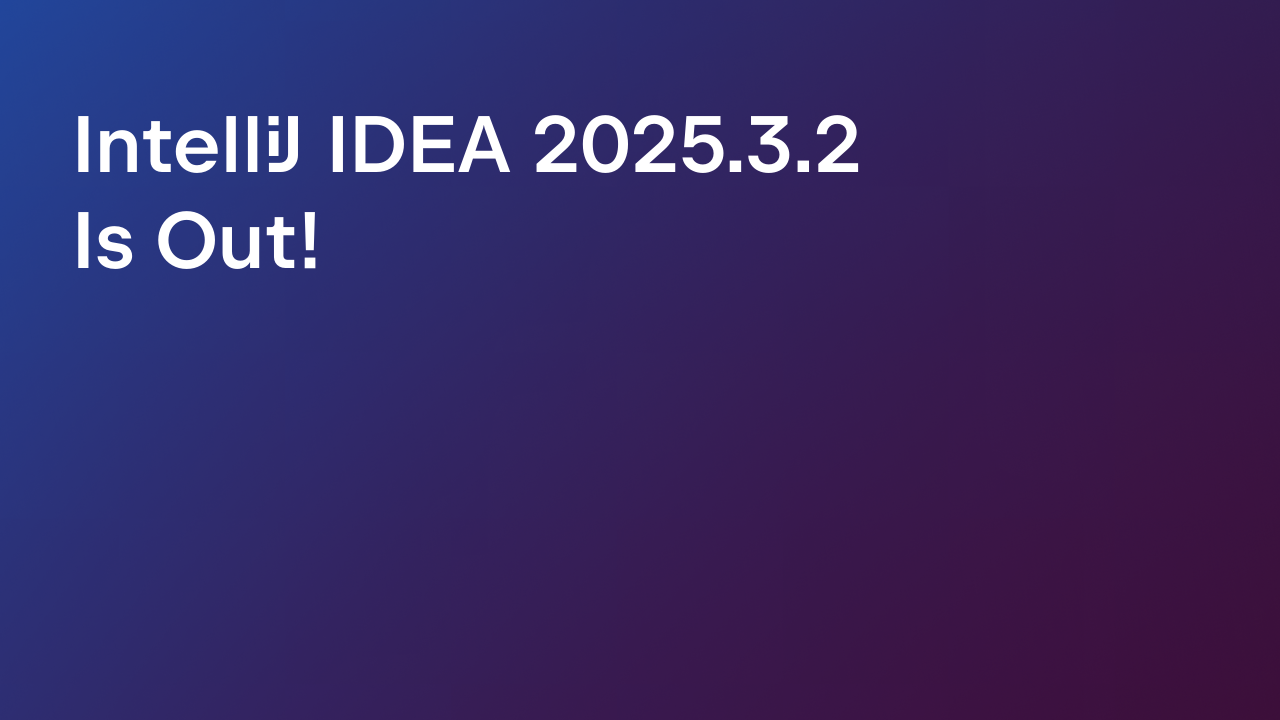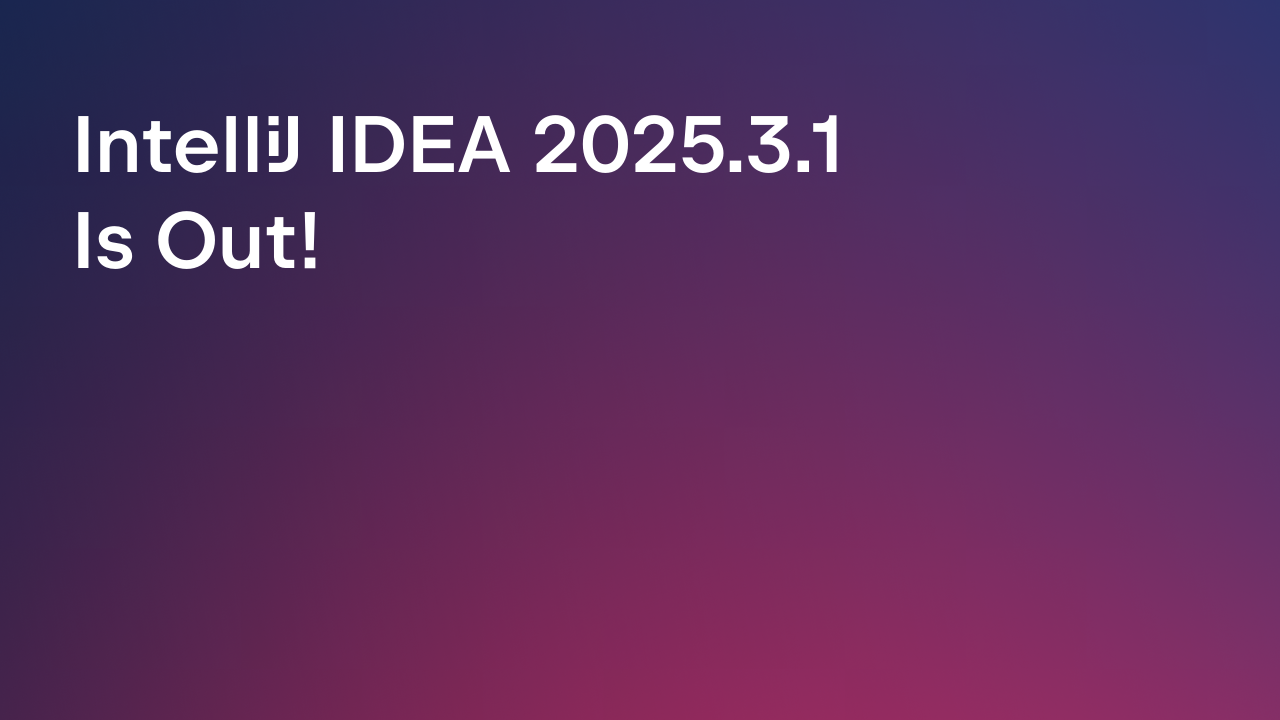IntelliJ IDEA
IntelliJ IDEA – the Leading IDE for Professional Development in Java and Kotlin
IntelliJ IDEA 2024.2 Is Out!
IntelliJ IDEA 2024.2 has arrived, featuring a host of exciting upgrades to enhance your experience with the IDE.
You can get the latest build from our website, through the free Toolbox App, or via snaps for Ubuntu.
This release enhances Spring Data JPA support, simplifies cron expression management, and upgrades the HTTP Client with the GraalJS engine. Startup efficiency is improved, allowing you to dive into coding faster. Additionally, the new version integrates K2 mode (Beta) to boost the IDE’s performance and stability for Kotlin.
Watch our video overview to see these major enhancements in action.
This blog post highlights dozens of other improvements throughout version 2024.2. For a complete rundown of the new features, visit our What’s New page.
Key highlights
- We’ve enhanced IntelliJ IDEA’s Spring Framework support by enabling you to run Spring Data JPA methods directly in the IDE.
- Working with
cronexpressions is now easier with IntelliJ IDEA 2024.2, as it provides inline descriptions and autocompletion with pre-filled examples when implementing scheduled services with Spring, Quarkus, or Micronaut. - The HTTP Client now runs on GraalJS, offering support for the latest JavaScript standards and enhanced performance for your scripts.
- We’ve streamlined the startup experience by making the IDE functional with incomplete project models and enabling access to its key features during indexing, allowing you to dive into coding faster.
- IntelliJ IDEA 2024.2 integrates K2 mode, now in Beta, for improved IDE stability and performance when working with Kotlin. To activate it, go to Settings/Preferences | Languages & Frameworks | Kotlin. You can find more details in this blog post.
User experience
- We’ve made accepting full line code completion suggestions more intuitive and precise by implementing code highlighting and new shortcuts for incrementally accepting suggestions.
- As of version 2024.2, IntelliJ IDEA defaults to the new UI while the classic UI remains available as a plugin. Learn more.
- The Search Everywhere dialog now includes a preview option, allowing you to see codebase elements directly in the dialog for easier navigation and context.
- The IDE now automatically detects and uses your system’s proxy settings for seamless interaction with external resources and services.
- On Linux, IntelliJ IDEA now synchronizes the placement of windows to match your Linux desktop settings and offers redesigned control buttons for a look and feel that matches your OS.
- The Customize Main Toolbar dialog has been redesigned for better organization, making it easier to search for, add, and delete actions in the main toolbar.
AI Assistant
- JetBrains AI Assistant 2024.2 introduces significant enhancements, including improved cloud code completion, a streamlined UX with both single-line and multiline code completion suggestions, integration in the Terminal tool window, AI-assisted VCS conflict resolution, and more. Learn more about these and other updates in this dedicated blog post.
Java and Kotlin
- IntelliJ IDEA 2024.2 improves log management for Java and Kotlin. Learn more.
- A new inspection identifies cases where an expression is compared to itself.
- The Change Signature refactoring is now more intuitive with a new inlay hint that appears near modified code elements.
Scala
- IntelliJ IDEA 2024.2 enhances Scala 3 support with improved handling of fewer braces syntax in
for-comprehensions, export clauses, extension methods, and import suggestions that now include enum cases. - Error and syntax highlighting has been improved. The IDE now highlights class fields defined in parameter clauses as fields instead of parameters, highlights named arguments in a distinct color, and provides regex syntax highlighting in
Regex("...")just as it does for the regex syntax in"...".r. It also features better responsiveness when you fix highlighted errors. - We’ve improved code completion for Scala by automatically filling out all named arguments of methods and autocompleting literal values for union types in Scala 3. Enum cases are now suggested whenever an enum type is expected.
- We’ve enhanced the performance of compiler-based error highlighting. Additionally, IntelliJ IDEA now supports Scala compiler diagnostics, making them available as regular quick-fixes for easy application.
- The contents of
StringBuilderare now displayed as a string in the debugger. - IntelliJ IDEA now offers onboarding tips for Scala.
- Library download progress is now visible while you import sbt projects.
- Scala support now includes the functionality of Grazie, which provides advanced spelling and grammar checks in Scala comments.
Code editor
- IntelliJ IDEA can now natively render mathematical expressions in Markdown files.
- Sticky lines can now be set to appear for chosen languages either in Settings/Preferences | Editor | General | Sticky Lines or by calling the context menu with a right-click on a sticky line in the editor.
Profiler
- IntelliJ IDEA Ultimate’s built-in profiler now highlights your code by fading out and collapsing library calls, making it easier to investigate performance bottlenecks while still providing the option to expand and view detailed library call sequences and execution times.
Run/Debug
- The new Performance tab in the Run tool window provides real-time CPU and memory charts, execution times, and memory snapshots to help you identify performance bottlenecks and memory leaks.
- IntelliJ IDEA 2024.2 improves Kotlin debugging by allowing Step Over to iterate over
forEachloops and get into inline function lambdas, ensuring you don’t miss critical parts of your code. - The debugger now provides string variable visualizers for JSON, XML, and other formats, automatically choosing the relevant visualizer based on a given variable’s content.
- The Coverage tool window now shows only the classes that have changed in your current feature branch. To review the entire project’s test coverage and see all classes, disable the Show Only Modified Classes option.
Build tools
- IntelliJ IDEA 2024.2 offers new navigation and highlighting features for Gradle build scripts, providing smooth navigation to declared Gradle plugins and between version catalog files and build scripts in
libs.versions.toml, along with the option to run registered tasks directly from the gutter. - We’ve enabled incremental re-sync for Maven projects.
- There’s a new Invalidate Build System Caches and Re-sync action in File | Cache Recovery that allows you to instantly clear build system caches and resolve issues related to the structure of Maven, Gradle, or sbt projects.
Version control systems
- We’ve made it easier to resolve Java and Kotlin import statement conflicts, providing a new action that is accessible via the gear icon in the Merge tool window. You can set import conflict resolution to be performed automatically in Settings/Preferences | Tools | Diff & Merge.
- We’ve given tags a dedicated node in the Version Control widget, making it easier to check them out.
- The Local History dialog’s UI has been modernized. It now features a diff view alongside the list of changes. The Local History action now allows you to review multiple files or directories simultaneously.
- Settings for the Log tool window are consolidated in a dedicated settings page, accessible via Settings/Preferences | Version Control | Log or the new drop-down menu on the Log tool window’s toolbar.
- The Git log can now be opened as a tab in the editor for more workspace and easier navigation through the list of commits.
- We’ve added First Parent and No Merges options to the Graph Options menu in the Git tool window.
- We’ve refined the color encoding and layout of branch lines for the commit graph in the Log tab of the Git tool window.
The features and enhancements in version 2024.2 that are designed to facilitate work with frameworks, technologies, and databases, as well as the updates for web development, are accessible in IntelliJ IDEA Ultimate only.
Frameworks and technologies
- IntelliJ IDEA Ultimate now provides bean autocompletion and injection for Quarkus and Micronaut applications.
- We’ve extended JPA support with several new inspections.
- We’ve added the ability to trigger Spring
@Scheduledmethods in debug sessions, eliminating the need to manually adjust a method’s schedule and wait for it to start. - In the HTTP Client, we’ve introduced the
XPathfunction, which allows you to query elements from XML and HTML documents. Additionally, we’ve added numerous methods for manipulating XML and HTML documents, eliminating the need to parse XML manually. - The HTTP Client now supports iterating through variable collections, allowing you to compose a single HTTP request with a JSONPath collection and send requests for each element. In addition, you can access specific collection items in post-processing scripts using JSONPath syntax.
- The HTTP Client better supports working with APIs that provide specific methods, offering the ability to add custom methods.
- IntelliJ IDEA Ultimate now offers support for Jakarta Data, including coding assistance and inspections for repositories, method name completion and validation based on the data model, and parameter validation based on the method name.
- Jakarta query language support is now available, offering syntax highlighting, statement validation, and statement autocompletion based on the data model.
- We’ve significantly extended support for Terraform, now providing full line code completion for it, along with essential code insight features such as context-aware code completion, refined syntax highlighting, an improved error detection system with quick-fix suggestions and a quick documentation feature.
- Ktor’s development mode is now supported in run configurations and is now used by default when a new run configuration is created.
Remote development and collaboration
- Remote development workflows now feature better setting synchronization between the JetBrains Client, the desktop IDE, and the remote IDE, ensuring your development environment remains consistent.
- We’ve added reverse port forwarding for remote development workflows, allowing the remote IDE to connect to ports available on the client machine.
- Screen sharing in Code With Me calls is now redirected to the browser, allowing you to specify the sharing source – either a specific window or the entire screen.
- Code With Me session startup has been simplified, consolidating all permission settings into a redesigned popup. This allows you to start sessions in just two clicks and gives you the ability to adjust permissions during the session.
- We’ve implemented an End Session popup that prompts you to end, continue, or ignore inactive sessions after 30 minutes, with automatic termination if no action is taken within three minutes.
Database tools
- The new AI Assistant features for databases include text-to-SQL generation, assistance with modifying tables, and help with understanding and fixing SQL problems. You can use AI Assistant to generate and refine SQL code, request table modifications, and attach your database schema to the AI chat by typing # followed by the name of the database schema you want to add to the prompt.
- You can now import data from tabular files using customizable scripted loaders for the Excel, JSON, Parquet, and shapefile formats.
- The Related Rows action is now available in the floating toolbar. We’ve also moved the settings for this action into Settings/Preferences | Advanced Settings.
- We’ve made value completion automatic. This feature operates entirely locally, so completion variants are based on the other values already loaded in the current column.
Web development
- You can now run and debug TypeScript files while executing them from different entry points, including the file context menu, the Run widget, and the Current File configuration.
- Prettier integration is enabled in new projects with a direct
prettierdependency in their rootpackage.jsonand a Prettier configuration file at the same level. - The IDE can resolve link paths based on your project’s file system, providing autocompletion and navigation for Next.js, Nuxt, SvelteKit, and Astro.
- Svelte 5 snippets and render tags are now supported.
- We’ve implemented language server protocol (LSP) support for Astro and Vue Language Service v2.
JetBrains Runtime
Starting with IntelliJ IDEA 2024.2, all IDE updates will come with JBR21, offering enhanced security and performance as well as Wayland rendering support for Linux.
Other
To improve the IDE experience for native speakers of Chinese, Korean, and Japanese, we’ve bundled the support for these languages.
These are the most notable improvements introduced in IntelliJ IDEA 2024.2. For a detailed list of all the changes, please check the release notes.
We’d love to hear your feedback on the new features and enhancements, as it greatly contributes to the evolution of the product. You can get in touch with us on X (formerly Twitter) or leave a comment below. If you encounter any bugs while using the IDE, please report them to our issue tracker.
Happy developing!
Subscribe to IntelliJ IDEA Blog updates








